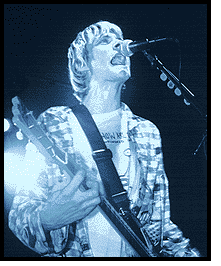|
| |

By Jon Savage GUITAR WORLD: Your lyrics contain some provocative gay references, in particular the line, "Everyone is gay" from "All Apologies." Is that a reflection of that time? KURT COBAIN: I wouldn't say it was a reflection of that time. I'm just carrying on with my beliefs now. I guess it is [provocative] in a commercial sense, because of how many albums we've sold. GW: It's very unusual to find bands talking about those kinds of things, particularly in the format that you're using, which is basically male rock. COBAIN: Yeah, but I think it's getting better, though, now that "alternative music" is finally getting accepted, although that's a pretty sad term, as far as I'm concerned. But at least the consciousness is there, and that's really healthy for the younger generation. GW: Have you had any problems from the industry or fans because of your gay references? COBAIN: Never. Pansy Division covered "Teen Spirit" and reworked the words to "Smells Like Queer Spirit," and thanked us in the liner notes. I think it said, "Thank you to Nirvana for taking the most pro-gay stance of any commercially successful rock band." That was a real flattering thing. It's just that it's nothing new to any of my friends, because of the music we've been listening to for the last 15 years. I suppose things are different now. If you watch MTV, they have these "Free Your Mind" segments in the news hour, where they report on gay issues and stuff like that. Pretty much in subtle ways they remind everyone how sexist the wave of heavy metal was throughout the entire Eighties, because all that stuff is almost completely dead. It's dying fast. I find it really funny to see a lot of those groups like Poison-not even Poison, but Warrant and Skid Row, bands like that-desperately clinging to their old identities, but now trying to have an alternative angle in their music. It gives me a small ill to know that I've helped in a small way to get rid of those people-or maybe at least to make them think about what they've done in the last 10 years. Nothing has changed, really, except for bands like Sol Asylum who've been around for like 12 years, have been struggling in bars forever, and now have their pretty faces on MTV. Still, they have a better attitude than the metal people. I think it's healthier. I'd much rather have that than the old stuff. GW: The track that first got me into Nirvana was "On a Plain." But what's it about? COBAIN: Classic alienation, I guess. Every time I go through songs I have to change my story, because I'm as lost as anyone else. For the most part, I write songs from pieces of poetry thrown together. When I write poetry it's not usually thematic at all. I have plenty of notebooks, and when it comes time to write lyrics, I just steal from my poems. GW: Do you put them together very quickly? COBAIN: Usually right before I record the vocals! Sometimes, I finish the lyrics the month before we go into the studio, but for the most part, 90 percent of them are done at the last minute. GW: Is that how the songs on In Utero were written? COBAIN: A little less so. There are more songs on this album that are thematic, that are actually about something rather than just pieces of poetry. Like, "Scentless Apprentice" is about the book, Perfume, by Patrick Süskind. I don't think I've ever written a song based on a book before. GW: Did you read much when you were a kid? COBAIN: Yeah, just whatever I could get. I went to the library a lot, and I skipped school a lot, especially during high school, junior high, and the only place to go during the day was the library. But I didn't know what to read, it was just whatever I found. During grade school I would read books by S.E. Hinton [author of The Outsiders and other works about teen angst and alienation]; I really enjoyed those. I read a lot in class too, when I went to school-just to stay away from people so I didn't have to talk to them. A lot of times I'd even just pretend to read, to stay away from people. |
 In part two of this historic lost interview, conducted in July, 1993, Nirvana's late, great
Kurt Cobain discusses alienation, songwriting, his initial fear of success and much more. If you haven't yet
read Part one,
In part two of this historic lost interview, conducted in July, 1993, Nirvana's late, great
Kurt Cobain discusses alienation, songwriting, his initial fear of success and much more. If you haven't yet
read Part one,